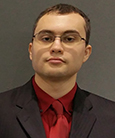Editor’s note: A previous version of this story incorrectly stated the amount of students awarded with Aylesworth scholarships.
Two graduate students at Florida universities have been named recipients of scholarships from the Aylesworth Foundation for the Advancement of Marine Science.
The winners are Bryan Keller, a Ph.D. student at Florida State University and James Conrad, a Ph.D. student at the University of South Florida.
Since 1986, the Aylesworth scholarship has supported students pursuing college degrees in disciplines that have direct application to marine science. Recipients continue to receive funding from the award each year as long as they make satisfactory progress toward degree completion.
The scholarship is a joint effort of the Aylesworth Foundation, the Southeastern Fisheries Association and Florida Sea Grant. Scholarships worth more than $600,000 have been awarded to 121 students in 14 Florida universities over the past 30 years.
The winners will be recognized at the annual Southeastern Fisheries Association awards banquet in June. More information about each recipient follows.

James Conrad
James Conrad, a second-time winner of the Aylesworth Scholarship, is a Ph.D. student in biology at the University of South Florida. He is studying why Vibrio vulnificus, a naturally occurring bacteria found in warm, coastal waters worldwide, is capable of causing human illness in some environments at certain times of the year, but not others.
To do this, he is investigating whether modifications to Vibrio’s genetic material contribute to its harmfulness. Human illness from the bacteria is rare, but is usually severe and can be fatal in certain at-risk individuals.
“I began working with V. vulnificus while earning my master’s degree and became fascinated with it because of its unusual characteristics and pathogenic nature,” Conrad said.
“These bacteria grow in very diverse environments including warm coastal water, on plants and fish, and accumulate in oysters. It has no distinguishing disease-causing factors like cholera, yet there is a genetically distinct sub-population of V. vulnificus that is associated with human infections.”
Conrad received both his bachelor’s and master’s degrees in biology from James Madison University. His career goal is to combine next-generation genome sequencing data with lab and field work to protect people from waterborne disease.
Conrad’s adviser Valerie Harwood, a professor in USF’s Department of Integrative Biology, said Conrad’s research is timely and necessary to ensure safe seafood in the future.
“V. vulnificus is the leading cause of seafood-related deaths in the U.S. and has the potential to become more widespread as waters warm due to global climate change,” Harwood said. “This information will in turn lead to safer shellfish, and improved consumer health, thus benefiting the (shellfish) industry.”

Bryan Keller
Bryan Keller is pursuing a Ph.D. in biological oceanography at Florida State University. He is studying the seasonal migrations of coastal sharks.
“Many species of sharks migrate to and from the same locations each year, but we do not know how they achieve this success,” Keller said. “My work is focused on determining if these sharks use magnetic-based navigation, like using a compass, which is common in other marine animals like sea turtles.”
Keller, who grew up far from the ocean in Arizona, became interested in marine research after an unpleasant experience working at a fish store. As a 14-year-old, he was paid $5 an hour to smell astro snails to determine which individuals had survived the summer heat.
“Over the next five years, I grew thousands of dollars worth of coral from the small colonies I purchased with the money I made at the store,” Keller said. “These experiences motivated me to major in ecology and evolutionary biology at the University of Arizona.”
After earning his bachelor’s degree and working at an aquaculture lab at the university, Keller went on to receive his master’s degree in marine science at Coastal Carolina University. Before beginning his Ph.D. program, the certified scuba diver worked as a scientific director at Global Eco Adventures and conducted his master’s research at the Bimini Biological Field Station in the Bahamas.
Dean Grubbs, the associate director for research at FSU’s Coastal and Marine Laboratory, said Keller’s research has potential implications for conservation biology.
“The sensory modes and mechanisms used by marine animals for navigation and migration have been investigated for decades, but are largely unknown for sharks and their relatives.” Grubbs said. “Bryan has proposed to use a combination of state-of-the-art telemetry technologies and advanced geomatic modeling to conduct this research. I look forward to him progressing in my lab and predict he will become a productive member of the scientific and marine conservation communities.”



